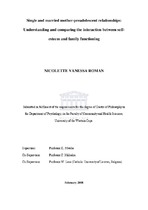Single and married mother pre-adolescent relationships: understanding and comparing the interaction between self-esteem and family functioning
Abstract
The main purpose of this study was to assess the psychological well-being of mothers and their pre-adolescent children (aged 10-12). Specifically, the study used a mixed methods sequential explanatory design to compare and understand the interaction between 245 single and married mother-pre adolescent relationships with regard to self esteem, autonomously-supportive and psychologically controlling parenting practices. And their familial enviironment within low and high socio-economic settings. A qualitative component was used to explore mothers' understanding of their relationships with their pre adolescent children. The Coppersmith- Self-steem Inventory and the Satisfaction with Life Scale were used to assess the psychological well-being of mothers and children, the Perceptions of Parents Scale for autonomously-supportive maternal parenting practices, Parent Psychological Control for psychologically controlling parenting practices and the environment Scale for family functioning. The findings provide an understanding of how healthy families function within enhancing and hindering environments and empasises the importance of parenting.

